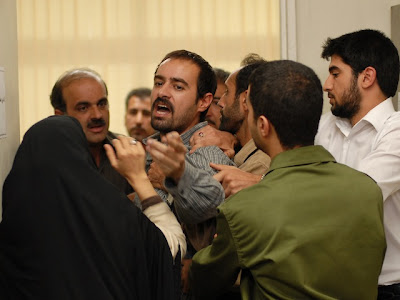It’s hard to believe that A Separation is an original screenplay. This domestic drama transforms you from a mere movie-watcher into a voyeur, a judge, an adjudicator-- as if you constantly want to interrupt everybody in the movie and say your piece or settle the matter.
Such is the pull of the Iranian film A Separation, winner of this year's Oscar Best Foreign Picture; you unwittingly cross over to a place where you forget that you're watching a movie, but instead you feel like you are either the neighbor, the relative of the characters, or the characters themselves.
The film opens with secular husband and wife Nader (Peyman Moadi) and Simin (Leila Hatami) arguing before a judge. Simin wants a better life for their daughter in the US, whereas Nader refuses to leave Iran, unable to leave his father with Alzheimer's. Simin's solution? Divorce-- which was denied her.
The marital trouble propels us into a series of conflicts that already goes beyond Nader and Simin's family problem. Immediately entering into the picture is Razieh (first-time actor Sareh Bayat) a lower class fundamentalist Muslim that Nader hires to look after his father while the angry and stubborn Simin is staying at her parents' house. Razieh, with her small wide-eyed child in tow, creates another set of problems through a mysterious incident, which eventually causes her family and Nader's to clash in a complicated conflict of religion and morals.
Writer-director Asghar Farhadi delivers a raw, genius, and neorealist storytelling, brilliantly putting the viewer on neutral ground, your compassion swinging from one family to another, from one character to another, sometimes putting you in a frustrating position because you have to go along with the unfolding of events to solve the mysterious incident. The movie is never preachy, and only offers us a perspective of an outsider so that you are only allowed to watch and listen, never given access to secrets until they are spoken in the movie.
The reason why the conflicts are so realistic is because the characters feel real; well-written and highly distinct from one another, their lines are delivered so perplexingly natural, filled with interruptions, stammering, and facial expressions that are so subtle that you have to be naturally emphatic or intensely discerning to notice. The performances are effortless and soulful (only Simin failed to hit 100 percent realism) that you can't image that a script ever existed. Adding to its effectiveness are the camera shots that only frame scenes in a way that only shows you what is relevant in the moment, sometimes obscuring the subject, so that the entire movie strictly puts you as a spectator or from the point of view of a character. It puts you in the scene, yes, but limits your vantage point, which in turn intensifies your emotions.
Do not expect a story with a clear protagonist and antagonist; A Separation is a documentation of contemporary Iranian families, a social commentary presented through two ordinary families suddenly finding themselves in a high-tension drama.
Do not expect a story with a clear protagonist and antagonist; A Separation is a documentation of contemporary Iranian families, a social commentary presented through two ordinary families suddenly finding themselves in a high-tension drama.
4.5 out of 5 stars


Comments
http://www.dekaphobe.com/
@Anonymous, I'm not sure, sorry. :)